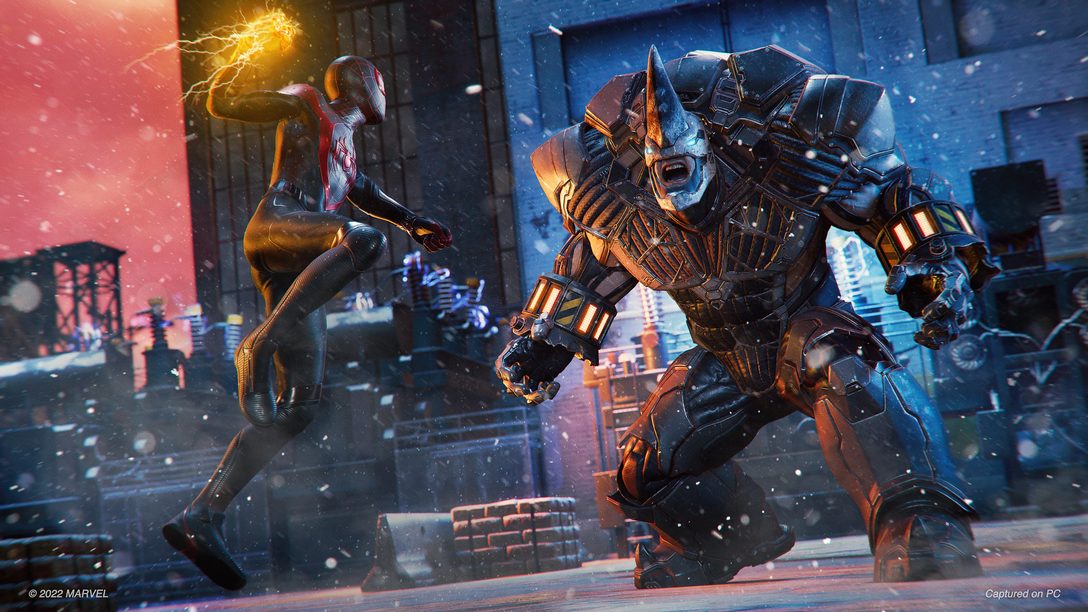
Nixxes discusses bringing Miles’ powers to PC
Today we celebrate the launch of Marvel’s Spider-Man: Miles Morales on PC! Like the PC version of Marvel’s Spider-Man Remastered released earlier this year, this has been a close collaboration with Insomniac Games, Marvel Games and PlayStation. We are very excited to bring the adventures of Miles Morales to a new audience and let PC players experience the rise of Miles as a new Spider-Man.
Configurability and customization are key aspects of PC gaming. At Nixxes we want to make sure the game is enjoyable on a wide range of systems, varying from handheld devices up to high-end gaming PCs with the latest GPUs and ultra-wide monitors. Part of that was ensuring that Marvel’s Spider-Man: Miles Morales is playable with a range of input options. You can play with a controller, and there are lots of options to choose from. You can use a DualSense controller for PS5 with a wired USB connection to enjoy the full DualSense controller experience, including adaptive trigger feedback and haptic response. The game also supports a variety of other peripherals and innumerable remapping options with Steam Input. The game is also fully playable with mouse and keyboard, and an important part of that development was creating a default control scheme that makes players feel like they are in full control as they web swing at high speed or engage in spectacular battles against foes with Miles’ electric powers.

To give you more insights into how the mouse and keyboard controls were implemented in Marvel’s Spider-Man: Miles Morales, I’d like to introduce you to Bart Veldstra, Senior Systems Programmer at Nixxes.
“When we begin our work on mouse and keyboard controls, first we look at comparable titles and our own previous projects. Those also happen to include third person action-adventure games, so they give us a good idea of what we have tried and tested. Then we make an inventory of all the actions the player can do in the game, which actions occur the most and what combinations are possible.”
What follows next, is a one-on-one mapping. “We simply assign all the buttons from the gamepad to a key or button on the keyboard and mouse. For this first layout, we use key bindings that are commonly found in games, such as the WASD keys for movement and E and F for actions or attacks.”
Then the team starts playing with this basic mapping, to see where there are any potential issues, Bart explains: “One of the first sticking points that came up was the fact that you need to push two buttons to do a Finisher move. On a gamepad that’s easy and gamers are used to doing so. On a keyboard, which is quite a complex instrument, that does not make much sense.”
“Based on that experience, we decided to make dedicated keyboard bindings for actions that use two buttons on a gamepad, like Finisher, Web Strike, Yank & Throw and Zip to Point. This makes it easier to execute these relatively complicated actions.”

The sheer number of keys on a keyboard makes this possible, but it is important to keep a balance in adding extra keys, says Bart: “Marvel’s Spider-Man: Miles Morales introduces five abilities for Miles. If we would add those as new key bindings on top of existing actions, we would risk players having to reach further for buttons to press. We took a step back to have a look at what Miles’ abilities do. They are a modifier on your standard abilities, so we decided to put their trigger as a modifier on the right mouse button. When you hold the right mouse button and press the key for an action like a punch or a jump, you will activate the variant. This way we don’t overload players with extra keys.”
It is not always easy to find a one-solution-fits-all approach when working on a mouse and keyboard layout. The large number of abilities and actions players have in both Marvel’s Spider-Man Remastered and Marvel’s Spider-Man: Miles Morales, proved a challenge, says Bart: “We juggled with the Dodge action for example. That is mapped to the Control key, but how well that works depends on how big your hand is. We decided to keep this binding, but also added an alternative binding on the mouse side button. If you have a gaming mouse with extra buttons, having Dodge on the side button works really well.”
The goal of the default key mapping is to make the most prominent game features the most effective. With configurable key mapping, you can play Marvel’s Spider-Man: Miles Morales however you want. Bart: “We want to make sure people don’t have to twist their fingers uncomfortably playing with keyboard and mouse, but you can rebind whatever key you want. If you have a fancy mouse with a lot of buttons, you can play the whole game with just your mouse.”

As mentioned, configurability and customization are key aspects for PC gaming, so in addition to multiple input options, Marvel’s Spider-Man: Miles Morales also has an extensive graphics menu with many customizable features, presets, and quality levels to choose from, including options for ray-traced reflections and ray-traced shadows, and the latest performance enhancing upscaling technologies, like NVIDIA DLSS 3. Check out our previous blog for more details.
We can’t wait to hear about your experiences playing Marvel’s Spider-Man: Miles Morales on PC, and we look forward to seeing more of your amazing creations in Photo Mode. Be sure to share those with the hashtag #MilesMoralesPC so we won’t miss out on them!
Marvel’s Spider-Man: Miles Morales for PC is available now on Steam and in the Epic Games Store.
Link your Steam Account to PlayStation Network to receive Early Access to the Miles Morales 2099 Suit, and two Skill Points. Link portal can be found on the Marvel’s Spider-Man: Miles Morales game menu.












Comments are closed.
17 Comments
Loading More Comments